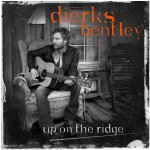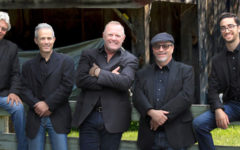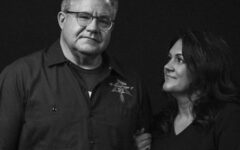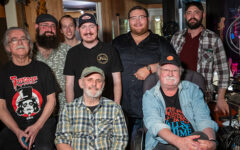 Today, June 8, marks the official release of Dierks Bentley’s much anticipated ‘bluegrass album,’ Up On The Ridge. We have spoken of it several times here on Bluegrass Today, and Bentley has been making a full-on media push this past week, so chances are you may have heard about the CD, and even heard some of the music.
Today, June 8, marks the official release of Dierks Bentley’s much anticipated ‘bluegrass album,’ Up On The Ridge. We have spoken of it several times here on Bluegrass Today, and Bentley has been making a full-on media push this past week, so chances are you may have heard about the CD, and even heard some of the music.
It has been very gratifying to us to see the widespread media attention to this project. We have watched a number of pop performers approach bluegrass music in the past after their mainstream sheen has worn thin, often in an attempt to revitalize a lagging career. (Not that there’s anything wrong with that! ‘Everyone into the pool,’ is what we say.)
In Bentley’s case, however, he is at the height of his popularity, and is very publicly embracing bluegrass and acoustic music, and bringing some of our more innovative standard bearers along for the ride. He has been touring much of the past six weeks with The Travelin’ McCourys (Ronnie and Rob McCoury, Jason Carter and Alan Bartram), has Sam Bush prominently featured in his latest music video (Up On The Ridge), and makes extensive use of Chris Thile and Punch Brothers on the new record.
We spoke with Dierks recently about all of these matters, and found him to be completely genuine in his appreciation for our music, and his aggressive attempt to expose his many country fans to the joys of the bluegrass. His is a young audience, and making Punch Brothers such a big part of this album will certainly have an appeal.
I asked Bentley how he came to involve them in this project.
“I’m a huge fan of Chris’, and loved Nickel Creek. JR [co-producer Jon Randall] is also a big fan, and he turned me on to Punch Brothers. I would put their CD on in the bus and challenge the guys in the band to listen to it. It really requires your full attention.”
To my ear, the most memorable cuts on the CD are three that were recorded with Punch Brothers. One is a blistering version of Roving Gambler that demonstrates that no matter how far afield Thile et al. may go, they still remain frightening well-versed in in-your-face bluegrass – and that Bentley is, himself, a fine purveyor of the style.
Dierks said that they put Roving Gambler down in a single pass.
“The only thing we changed was to tighten up Chris Eldridge’s guitar solo – we cut out a little bit of that to make it fit. No one went back and fixed anything.
I had a lot of fun recording with Chris and them in New York City. I was there for three days, and it was different from the way we work in Nashville. We would wake up at 10:00, start recording at 2:00, and work until 10:00 pm. Then Chris would take me on the town in Brooklyn.
Seeing him in his element was great fun.”
Much of the material was written by Bentley and Randall, but my very favorites are acoustic covers of songs from outside of either bluegrass or country music. Bob Dylan’s Señor had been covered bluegrass style by Tim O’Brien on his terrific Red On Blonde CD in 1996, which gave Dierks his idea to record it.
“I learned that song from Tim O’Brien – I loved that CD and that song. Tim killed it – you could never top that, so I figured we would take it in a different direction. Having Chris and me trade verses seemed like a great idea from the start.”
The magnum opus, however, is their reworking of U2’s hit, Pride (In The Name Of Love). It’s a prototypical example of what you get when you combine a wonderful song, virtuosic musicians and passionate vocalists together in the studio… that’s when the magic happens.
Considering the original recording, one would be hard pressed to imagine a more evocative and plaintive rendering, but I think Dierks and Punch Brothers have pulled it off. Del McCoury provides a haunting tenor vocal on the chorus, and Punch Brothers lay down as fine a texture of acoustic instruments as I have ever heard.
“Me and Chris were sitting on my porch drinking whiskey and jamming, and we started working on that tune. It would really have been cheesy if we had just grassed it up, but Chris put a lot of thought into the arrangement.
He went back and put some tracks down in GarageBand, and then started getting Gabe and Noam involved. When we went in to record they had the whole thing worked out.”
Pride (In The Name Of Love): [http://www.bluegrasstoday.com/wp-content/uploads/2010/06/pride.mp3]
The title track from the new CD was released as a single several weeks ago, with a music video. Bentley spoke of how this new album, which he described as a very personal project, helped him see how jaded he had become about the business.
“I didn’t really focus on how lucky I have been to find success in the music world. It had reached the point where I didn’t care about breaking into the Top 40, waiting until a song was in the Top 5 to pay attention. I had become so spoiled…
When Up On The Ridge was released as a single, I was watching the charts very carefully, and was so excited when it made it top the Top 40.”
His label, Capitol Records Nashville, had been expecting a pair of new releases when Dierks went in to the studio last year.
“I had told them I was going to cut both a country and a bluegrass record. Before even approaching them about budgets and schedules, I started thinking… ‘I know all these Nashville bluegrass pickers. I can get them on the phone and do this on my own.’
I also wanted Randall involved, and once he came on as co-producer and we started trading ideas, it became more of a hybrid record.
We took it to Capitol as a finished project and [Capitol Nashville president/CEO] Mike Dungan jumped all over it. Everybody there is all on board. They are really supporting this album.”
In fact, Dungan was quoted in a recent Billboard piece as saying:
“Too many people play it safe,” Dungan says. “I don’t think it’s too far out there that it’s going to in any way derail him. I think it makes perfect sense … If careers are going to be hampered … by something great, then there’s something wrong with the world.”
Dierks expressed a sentiment that reminds me a bit of the ‘back to country’ movement in the 1980s, in which Ricky Skaggs played a big part.
“Country music people get so defensive when others react react negatively, turning up their nose at the very idea of country music. But we are sometimes guilty of the same thing where bluegrass is concerned.
If country can go pop and go rock, it can certainly go grass.”
What he said…
Give this CD a listen folks. There is some brilliant music here, and it has the potential to be a breakout opportunity for bluegrass.







